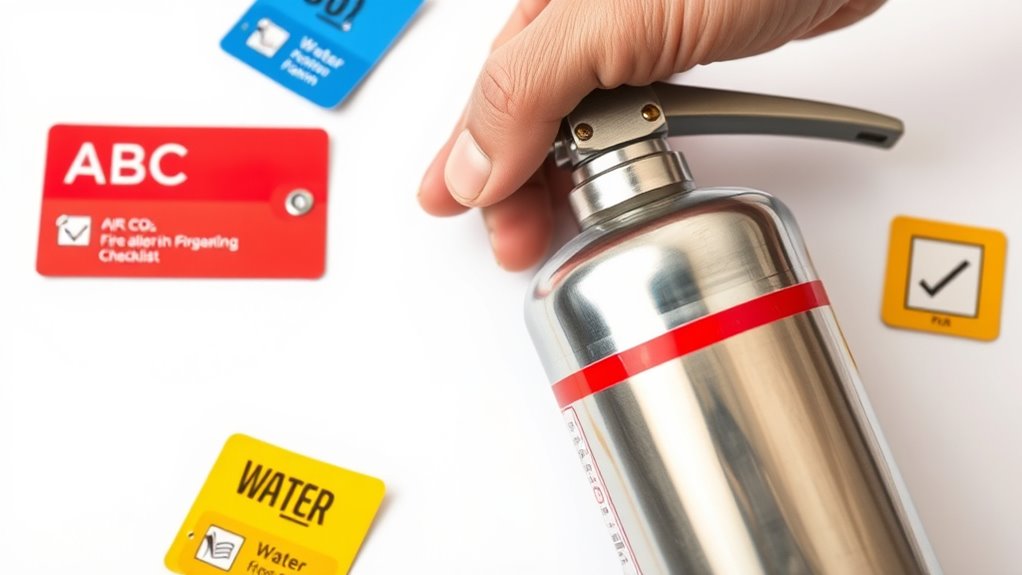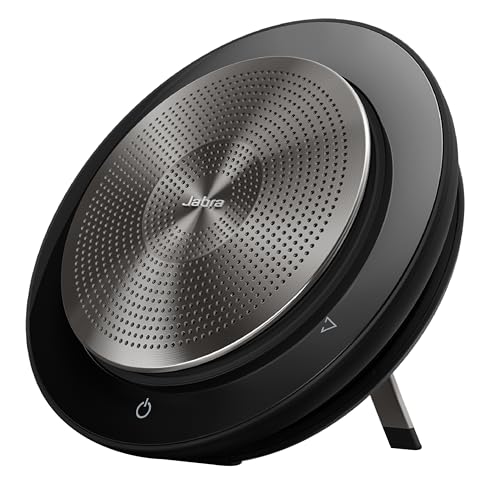To troubleshoot fire extinguisher types, start by checking for visible damage, corrosion, or leaks, and make certain the pressure gauge shows it’s fully charged. Confirm the nozzle isn’t blocked and the safety pin is intact. For different types like ABC or CO2, verify you’re using the right extinguisher for the fire class. Regular maintenance, proper selection, and correct usage are key—continue exploring to learn how to keep your extinguishers effective and safe.
Key Takeaways
- Identify the fire class to select the appropriate extinguisher type (e.g., ABC, CO2, foam).
- Check for visible damage, corrosion, or leaks that could impair extinguisher effectiveness.
- Verify the pressure gauge is in the operable (green) zone before use.
- Ensure the extinguisher is properly maintained, charged, and within its expiration date.
- Confirm the extinguisher’s accessibility and that it matches the fire risk for quick deployment.

Bluetooth 5.2 Receiver for Home Stereo, RCA & 3.5mm AUX Out Put, Wireless Audio Adapter for Stereo Receiver&Amplifier, Low Latency HiFi Music Streaming
Designed for Home Stereo Systems:Outputs Bluetooth audio via RCA or 3.5mm AUX to stereo receivers and amplifiers, adding...
As an affiliate, we earn on qualifying purchases.
Fire Extinguisher Maintenance and Selection Tips

Fire extinguishers are fundamental safety tools, but they only work effectively if they’re in proper working condition. To guarantee your extinguisher is ready when you need it, regular extinguisher maintenance is essential. This includes visually inspecting the unit for signs of damage, corrosion, or leakage, and confirming that the pressure gauge indicates full or operable status. Proper maintenance doesn’t just involve checking the exterior; it also means verifying the internal components and ensuring the extinguisher’s expiration date isn’t past, as outdated units can fail during an emergency. If you notice any issues during inspection, address them promptly—either by repairing if possible or replacing the unit altogether. Ensuring your fire safety equipment has diverse designs can improve accessibility and ease of use in emergencies.
Choosing the right extinguisher is the first step in effective fire safety. Different fire classes require specific types of extinguishers: for instance, a water extinguisher works well on ordinary combustibles like wood and paper, but it’s useless on electrical fires or flammable liquids. A multi-purpose ABC extinguisher covers a broad range of fires and is suitable for most environments, making it a popular choice for homes and workplaces. When selecting your extinguisher, consider the type of fire risks present and consult safety guidelines to guarantee you’re choosing the most effective option. Remember, the right extinguisher isn’t just about fire class compatibility; it’s also about size, weight, and ease of use, especially if someone else might need to operate it during an emergency.
Once you have the correct extinguisher, maintaining it properly is essential. Regularly check the pressure gauge to confirm the needle stays in the green zone, indicating it’s ready for use. Keep the unit in an accessible location, free from obstructions, and ensure everyone knows where it is and how to operate it. Periodic inspections should also include checking the nozzle for blockages, ensuring the safety pin and tamper seal are intact, and verifying the label is clear and legible. If you notice any signs of damage or if the extinguisher has been discharged, it’s necessary to recharge or replace it immediately. Remember, a well-maintained and correctly chosen extinguisher can make all the difference in controlling a fire before it spreads, protecting lives and property.

UGREEN Bluetooth 6.0 Receiver with LDAC, Hi-Res Wireless Audio Adapter with Low Latency, for Old Stereo/Speakers/Wired Speakers/Home Audio Music Streaming Stereo System
High sound quality LDAC decoding: The Bluetooth audio adapter features the LDAC audio codec, audio sampling rates up...
As an affiliate, we earn on qualifying purchases.
Frequently Asked Questions
How Often Should Fire Extinguishers Be Inspected by Professionals?
You should have fire extinguishers inspected by professionals at least once a year to make certain the inspection schedule is maintained. Regular professional maintenance helps identify issues like pressure loss or damage early. Additionally, perform visual checks monthly to confirm the extinguisher’s accessibility and condition. Combining routine inspections with professional maintenance guarantees your fire safety equipment remains reliable and effective when needed most.
Can a Fire Extinguisher Be Used After Its Expiration Date?
When it comes to expiration concerns, it’s best not to take any chances. Using a fire extinguisher after its expiration date isn’t advisable because safety considerations come first. The pressure may have dropped, or the contents could have deteriorated, making it ineffective. It’s always smarter to replace expired units promptly, ensuring you’re prepared when it counts most—remember, an ounce of prevention is worth a pound of cure.
What Should I Do if a Fire Extinguisher Is Discharged Accidentally?
If you experience an accidental discharge, immediately guarantee everyone nearby is safe and evacuate if necessary. Check the fire extinguisher for damage and follow safety precautions by inspecting the pressure gauge and nozzle. Recharge or replace the extinguisher as needed, and report the incident to proper authorities or maintenance personnel. Remember, handling accidental discharges carefully helps prevent future issues and maintains safety in your environment.
Are There Portable Fire Extinguishers Suitable for Outdoor Use?
Yes, there are portable fire extinguishers suitable for outdoor use. Look for models with outdoor durability and corrosion resistance, which withstand harsh weather conditions like rain, humidity, and temperature fluctuations. These extinguishers are designed to remain effective in outdoor environments, ensuring safety when fires occur outside. Always check the product specifications to confirm it meets outdoor use standards, and regularly inspect it to maintain ideal performance.
How Do I Choose the Right Fire Extinguisher for My Home?
Choosing the right fire extinguisher for your home is like selecting a guardian angel, essential for your safety. Focus on your home safety needs and fire prevention. A multi-purpose ABC extinguisher is ideal, handling most common household fires, from electrical to kitchen fires. Place it in accessible spots like the kitchen and garage. Regularly check its pressure and expiry date to guarantee it’s always ready to protect your loved ones.
![Troubleshooting Checklist: Fire Extinguisher Types 6 [Upgraded] 1Mii B06Pro Long Range Bluetooth Receiver, HiFi Wireless Audio Adapter, Bluetooth 5.3 Receiver with 3D Surround aptX HD Low Latency Optical RCA AUX 3.5mm Coaxial for Home Stereo System](https://m.media-amazon.com/images/I/41ZGeOnD1xL._SL500_.jpg)
[Upgraded] 1Mii B06Pro Long Range Bluetooth Receiver, HiFi Wireless Audio Adapter, Bluetooth 5.3 Receiver with 3D Surround aptX HD Low Latency Optical RCA AUX 3.5mm Coaxial for Home Stereo System
【DUAL ANTENNAS&LONG RANGE】With dual antennas and class 1 Bluetooth technology, the 1Mii B06Pro Long Range Bluetooth receiver can...
As an affiliate, we earn on qualifying purchases.
Conclusion
Now that you know the different fire extinguisher types, you’re practically a safety superhero! Keep your equipment well-maintained and always choose the right extinguisher for each fire type. Remember, a small mistake could turn into a blazing disaster—don’t let that happen to you. Stay vigilant, stay prepared, and you’ll handle any fire emergency like a pro. Your quick thinking and proper maintenance could save lives—you’re more powerful than you realize!

Jabra Speak 750 UC Wireless Bluetooth Speakerphone with Link 370 USB Adapter – Portable Conference Speaker for Holding Meetings Anywhere with Premium Audio - Certified for Zoom & Google Meet
PREMIUM AUDIO – With the Jabra Speak 750 Bluetooth Portable Speaker, you can hear and be heard when...
As an affiliate, we earn on qualifying purchases.










